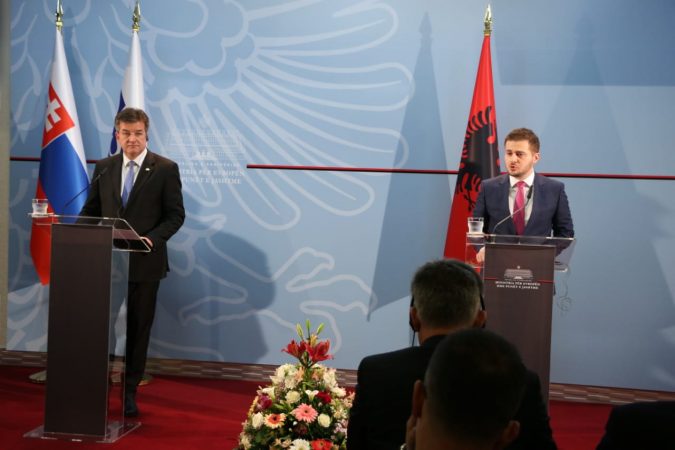Slovakia stands ready to help make Albania’s 2020 OSCE Chairmanship a success, says OSCE Chairperson-in-Office Lajčák in Tirana
TIRANA, 3 June 2019 – Visiting Albania, which will chair the OSCE in 2020, this year’s OSCE Chairperson-in-Office, Slovakia’s Foreign and European Affairs Minister Miroslav Lajčák, reiterated today in Tirana Slovakia’s commitment to supporting the country in preparing its 2020 OSCE Chairmanship.
“Holding the OSCE Chairmanship is challenging, but at the same time it is politically rewarding and a real chance for your country to demonstrate leadership and show your maturity and the progress you have made,” Lajčák said.
The Chairperson-in-Office discussed concrete steps of the preparation in his meetings with the Albanian leadership, including with President Ilir Meta, Prime Minister Edi Rama, Acting Minister for Europe and Foreign Affairs Gent Cakaj, and Speaker of the National Assembly Gramoz Ruçi as well as representatives of the opposition.
“From our own experience as Chair in 2019, strong political support on all levels is key for any successful Chairmanship,” he underlined.
Speaking about Albania’s achievements in the past years, Lajčák stressed the progress made in implementing its strategic reform agenda, strengthening democratic institutions, the rule of law and media freedom, and working towards meeting its long-term objectives. He encouraged his partners to continue on this reform path in an effective and sustainable way and to also address regional challenges such as corruption, organized crime or illegal migration in a regional, comprehensive and co-operative manner.
Emphasizing the strong Albanian-OSCE partnership aligned to the needs of the Albanian people, the OSCE, in particular on reforming the electoral system, strengthening the judiciary, building up professionalism of the police forces, increasing the participation of women in Albania’s public and promoting regional youth co-operation, the OSCE Chairperson said: “In the region, the OSCE grew with the countries and constantly adapts to their needs.”
In light of the recent protests, Lajčák made clear that listening to critical voices is key in a democratic society. “However, differences should be debated in parliament by all representatives, including the opposition and not on the streets,” he said.
“Violence and boycotts cut off any chance of dialogue – and therefore any chance of finding common ground and hamper Albania’s progress and public image,” the Chair continued. “Democracy requires checks and balances and a functioning opposition has a key role to play. Participation in democratic institutions is the only legitimate path to political power.”
While in Tirana, the OSCE Chairperson met with civil society representatives to hear from them about the current situation in the country, the progress made, and the additional reform efforts needed.
Lajčák also had the opportunity to meet with OSCE staff in Albania and to take stock of the OSCE’s activities on the ground. He commended their work with the Albanian authorities over the last 22 years.
